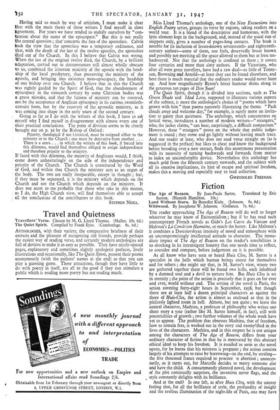Travel and Quietness
ANTHOLOGIES, with their variety, the comparative briefness of their extracts and the pleasure of recognising old friends, provide perhaps the easiest way of reading verse, and certainly modern anthologies are full of devices to make it as easy as possible. They have nicely-spaced pages, explanatory and sometimes slightly apologetic prefaces, lively illustrations and occasionally, like The Quiet Spirit, present their poems anonymously (with the authors' names at the end) so that you can play a guessing game. These attractions, though they have little to do with poetry in itself, are all to the good if they can stimulate a public which is reading more poetry but not reading much. Miss Lloyd Thomas's anthology, one of the New Excursions into English Poetry series, groups its verse by regions, taking readers on a world tour. It is-a blend of the descriptive and humorous, with the lyric element kept in the background, and, instead of the usual run of snippets only, gives a number of pages-long extracts. The book is notable for its inclusion of lessenbknown seventeenth- and eighteenth- century authors—some of them, one feels, deservedly lesser known and possibly not meriting all the space allotted to them but at least un- hackneyed. Not that the anthology is confined to these ; it covers four centuries and more than sixty authors. If the Victorians, who after all were great travellers, have had a raw deal—so little of Tenny- son, Browning awl Arnold—at least they can be found elsewhere, and here there is much material that the ordinary reader would never hunt up. And how magnificently Byron's bitter humour skims along in the generous ten pages of Don Yuan!
The Quiet Spirit, though it is divided into sections, such as The Green Shade and Ideal Love, supposed to illustrate various aspects of the subject, is more the anthologist's choice of " poems which have grown with him " than poems narrowly illustrating the theme. " Pack clouds away and welcome day," for example, is surely more an invita- tion to gaiety than quietness. The anthology, which concentrates on lyrical verse, introduces a number of modern writers—" strangers," who, the jacket claims, " can bear, surprisingly, a difficult comparison." However, these " strangers " prove on the whole that public judge- ment is sound ; they come and go lightly without leaving much trace. And one reader at least, who does not read verse straight on (as is suggested in the preface) but likes to cheat and know the background before brooding over a new extract, finds this anonymous presentation with its necessity of turning backwards and forwards from matter to index an uncomfortable device. Nevertheless this anthology has much gold from the fifteenth century onwards, and the subject with all its emotive implications, its hint of escape and spiritual freedom, makes this a moving and especially easy to read collection.
GWENDOLEN FREEMAN.


































 Previous page
Previous page